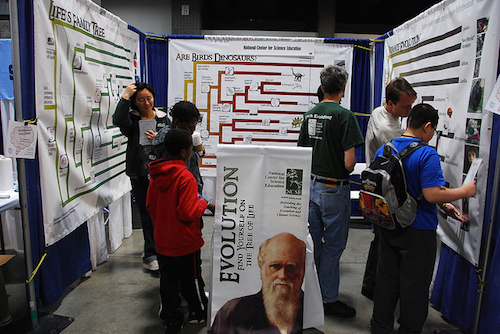 Education
Education
 Evolution
Evolution
A New Hire at the National Center for Science Education Admits "Many of Us Don’t Really Get Evolution"

Welcome to Stephanie Keep, newly appointed editor of Reports of the National Center for Science Education. She posted her first comments at the NCSE’s Science League of America blog. After gushing about her new appointment at NCSE (“Best. Thing. Ever.”), Keep, who was “trained as a paleobiologist at Wellesley College and Harvard University,” relates a story about a conversation she had with a friend. It concerns a classroom activity intended to teach a principle about evolution.
An editor friend of mine asked me the other day to read an activity she’s developing for middle school, one of the soon-to-be plethora of activities aligned to the Next Generation Science Standards. This particular one was about evolution, and asked kids to look for variation in a number of human traits and then infer adaptive explanations. For example, they could measure finger lengths and then come up with a reason that longer fingers are more adaptive than shorter ones. What followed was a half-hour conversation in which I tried my best to explain why that was a terrible idea for an activity. And here’s the thing — this friend of mine, she’s super-smart and has an advanced degree in biology from Harvard University. Now, she completely understood, once we discussed it, why that kind of activity will reinforce misconceptions about evolution (that every feature is adaptive, that you can infer a structure’s adaptive value from its current function, etc.), but we still had to have the discussion.
So here we have a Harvard-trained evolutionary biologist developing an activity to teach children a basic evolutionary concept, and it requires a half-hour conversation to get her to see that the exercise only reinforces “misconceptions” about evolution. You wonder if Keep’s friend may have missed class at Harvard the day determining adaptive value was discussed.
Be that as it may, the process of determining the adaptive value of a given biological structure is clearly rudimentary evolutionary biology, or so it would seem from the way Keep relates the story. How then could her Harvard friend be so naive as to create an activity that, rather than reinforcing and teaching the concept, reinforces a misconception about it?
Note too that the exercise is one of a “soon-to-be plethora of activities aligned to the Next Generation Science Standards.” Keep’s friend was fortunate that Ms. Keep was around to set her straight, but what of all the other science educators who will also be creating this plethora of activities intended to teach children about how evolution works? Will there be a Stephanie Keep around to help them when they err as well? What will ensure the integrity of the entire process, biologically and evolutionarily speaking?
Apparently, Ms. Keep shares this concern. She makes a rather startling admission at the end of her post:
I have worked for the past decade-plus with scientists, science writers, and science educators, all of whom have the best intentions in the world, all of whom would have no problem declaring their allegiance to the cause of an authentic science education grounded in evolution. But — and I don’t want to point fingers at anybody here — many of them would have not batted an eye if that activity had come across their desks. And this, I believe, is one of the most important truths we have to face: many of us don’t really get evolution.
This admission is so startling it deserves repetition: “…many of us don’t really get evolution.” Keep may be comforted to know that many in evolutionary biology feel exactly the same way. Some scientists, while unsympathetic to intelligent design, even call for a whole new theory of evolution. Go check out The Third Way, the new website where scientists like that congregate. And read the extended paperback edition of Darwin’s Doubt, published today, where Stephen Meyer weighs and analyzes some representatives of this welcome approach to rethinking evolution.
Even more startling, though, is that the process of creating a “plethora” of activities to teach children about how evolution works continues apace, even though many of those creating the activities don’t get how evolution actually works. Will any review panel with the NGSS possessing the requisite knowledge have the opportunity to say yea or nay to any of the plethora of new teaching activities? If, as Keep admits, “many of us don’t really get evolution,” what ensures that those approving of any teaching activities are among the few who do get evolution? What, precisely, is it that they “get” that educators like Keep’s friend do not?
Bear in mind, too, that the very educators who don’t get evolution are also the ones who fuss and complain whenever a state legislator or science standards committee member proposes language about “teaching the strengths and weaknesses” of evolution. From the way they kvetch, you would think there are no weaknesses in evolutionary theory. But if many of them don’t get evolution in the first place, how would they know?
Keep says that evolution is a “beautiful, simple, and powerful idea, but it’s also finicky, demanding vigilant attention to detail to be properly explained and explored.” Perhaps Keep could provide a helpful list of exactly what those details are so educators like her Harvard-trained friend can stay on the straight and narrow Darwinian path, lest they join the chorus calling for a new theory of evolution.
I’m on Twitter. Find me @DonaldM75.
Photo credit: Adam Fagen/Flickr.
